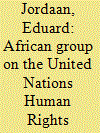| Srl | Item |
| 1 |
ID:
147232


|
|
|
|
|
| Summary/Abstract |
During the early years of the United Nations Human Rights Council, formed in 2006, the African Group obstructed efforts to scrutinize and improve human rights in specific countries, notably in the cases of Darfur and the Democratic Republic of the Congo. However, in recent years the African Group has become willing to address country-specific human rights violations, particularly in Côte d'Ivoire, Libya, and Eritrea. This article documents the African Group's shift and asks why it occurred. Against the backdrop of debates about whether the liberal international order can survive a decline in American dominance, the study of the African Group's shift grants us insight into the elements that underpin liberal internationalism. Three explanations for the African Group's shift are considered: an improvement in the domestic human rights profile of African Group members, changes to the internal dynamics of the African Group, and the influence of the United States. The article concludes that American power was decisive, a finding that raises doubt about whether the liberal international order will survive a decline in American power.
|
|
|
|
|
|
|
|
|
|
|
|
|
|
|
|
| 2 |
ID:
177570


|
|
|
|
|
| Summary/Abstract |
This article scrutinises the Palestinian ‘smart power’ strategy of demonising Israel and diminishing its ability to defend itself against violence. The United Nations Human Rights Council (UNHRC) and the International Criminal Court (ICC) offered the best vehicles to execute this strategy. The article critically examines three Committees of Inquiry (COI) the UNHRC established to investigate alleged Israeli war crimes during confrontations with Hamas in Gaza. It demonstrates that the COIs biased mandates, selection of chairs and members, investigative methods, selection of evidence, and final reports were all deliberately designed to find Israel guilty of war crimes at the UNHRC and the ICC.
|
|
|
|
|
|
|
|
|
|
|
|
|
|
|
|
| 3 |
ID:
107909


|
|
|
|
|
| Publication |
2011.
|
| Summary/Abstract |
This article examines states' voting records at the United Nations Human Rights Commission/Council during the period 1992-2008 on resolutions targeting specific countries, and tests competing hypotheses about voting behaviour derived from liberal and realist theory. I conclude that a liberal framework explains voting behaviour on resolutions addressing most states and show that democracies were more likely than non-democracies to support resolutions criticizing states with poor human rights records. However, I also show that the liberal framework fails to explain voting behaviour on resolutions addressing Israel because the issue uniquely polarized states according to geo-political groupings - Western democracies often opposed resolutions addressing Israel, but developing world states often supported these resolutions. These findings hold for both the Commission and its successor body: the Human Rights Council.
|
|
|
|
|
|
|
|
|
|
|
|
|
|
|
|
| 4 |
ID:
108473


|
|
|
|
|
| Publication |
2011.
|
| Summary/Abstract |
The mid-June endorsement by the United Nations Human Rights Council of a new set of Guiding Principles for Business and Human Rights has been welcomed as the authoritative global standard for corporations to respect human rights. The Guiding Principles are the culmination of a 6-year UN-commissioned study by Professor John Ruggie, which concludes that companies should carry out human rights due diligence to identify, prevent, mitigate, and account for how they address their adverse human rights impacts. Drawing on related regulation in Europe, this article considers how best to implement the Guiding Principles in Southeast Asia.
|
|
|
|
|
|
|
|
|
|
|
|
|
|
|
|